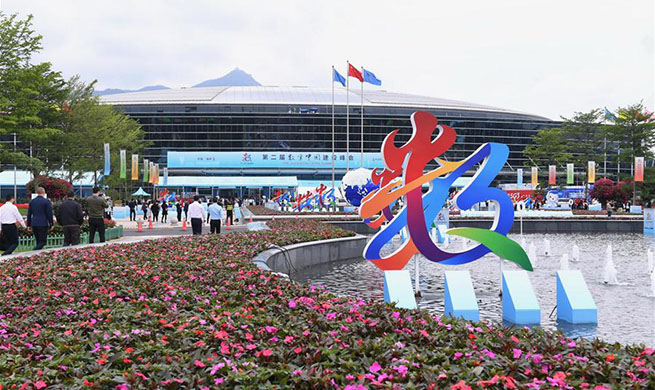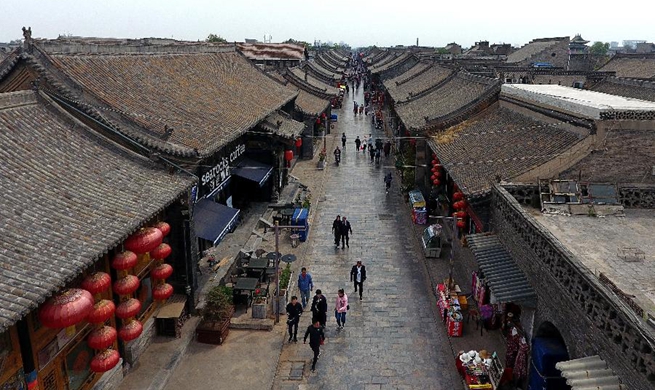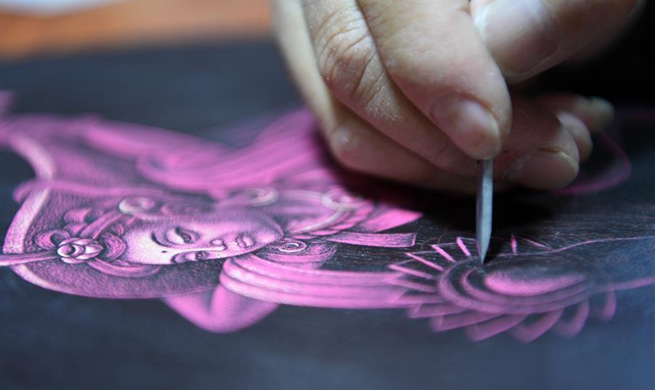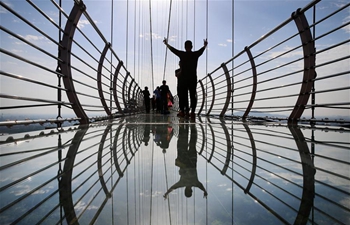by Xinhua writer Gao Shan
LOS ANGELES, May 7 (Xinhua) -- Renowned Chinese director Zhang Yimou's new action epic "Shadow" has hit big screens in North America, receiving highly positive reviews from American critics for its stunning action sequences, strong performance and remarkable images conjured from Chinese ink paintings.
Distributed by Well Go USA Entertainment, "Shadow" grossed 27,474 U.S. dollars in its opening weekend on four screens after it was limited released in North America on Friday, according to studio figures collected by measurement firm Comscore and released on Monday.
The film will expand to over 100 theaters in the next few weeks, with San Francisco, Toronto, Vancouver, Boston, Chicago, Seattle, and Phoenix getting the film this Friday.
The film, starring Deng Chao, Sun Li, Zheng Kai and Hu Jun, is an action-fantasy film set in China during the period of the Three Kingdoms (220-280 AD) and tells the story of body double -- "shadow" men who substituted royals and aristocrats in times of danger, ready to sacrifice their lives so their masters could live.
The latest production of Zhang made its world premiere at the 75th Venice International Film Festival last year. It has raked 627 million yuan (92.5 million dollars) since it was released in China on Sept. 30, according to the major Chinese entertainment industry outlet Mtime.
"Shadow" garnered favorable reviews from American critics, enjoying a 95 percent certified fresh rating to date on review aggregator Rotten Tomatoes with 40 reviews counted.
Told in elegant visuals featuring a desaturated palette that draws on traditional Chinese ink brush painting and the yin-and-yang symbol, Zhang's film alternates exquisitely composed and designed interior scenes with spectacular battle sequences in perennially rain-drenched exteriors -- in which umbrellas are turned into weapons.
The film was selected by The New York Times as last week Critic's Pick.
"After the limp 2017 film 'The Great Wall,' the director Zhang Yimou was clearly looking to enact a return-to-form. With 'Shadow,' Zhang has done more than that: He's created a martial-arts movie landmark, as strong in its performances as it is spectacularly novel in its violence," wrote film critic Glenn Kenny on The New York Times website.
"Acclaimed Chinese filmmaker Zhang Yimou returns to form with this visually resplendent combination of martial-arts epic, intimate character study, and compelling historical drama," wrote Todd Jorgenson, president of the Dallas-Fort Worth Film Critics Association, for the Cinemalogue.
"Shadow is a sumptuous sensory feast filled with spectacle, surprise, and madness," wrote Filipe Freitas for the Filmthreat.com.
Armond White, a film critic and a columnist for National Review, noted that "Shadow is visual Shakespeare."
"At this time, when most action movies are nothing but action, Zhang Yimou employs extreme stylization in Shadow... The film's abstract look - shot in color but making great use of monochromatic design - forces a viewer to concentrate on the themes in this ancient Chinese story."
Some critics agreed with White that staggering battles in the martial arts film are remarkable.
"And its fight sequences, which involve weaponized umbrellas that fire off spinning blades when twirled, are masterpieces of fight choreography and editing - as well as subtext," wrote Michael O'Sullivan for The Washington Post.
"The contrast of the enemy's hard masculine blades and arrows and the heroes' use of a traditionally 'feminine' accoutrement, which acts as both a defensive shield and an offensive projectile, again informs the movie's message," he added.
Kenneth Turan, a film critic for the Los Angeles Times, introduced the film as "an extravagant and exquisite visual tour de force with a plot that will take some time to sort out."
"An unlikely combination of wuxia-style pulp fiction and rarefied cinematic technique with some bloody Grand Guignol moments thrown in, 'Shadow' is definitely a film that goes its own way," he noted.
"Shadow takes its time- but when the action hits, your jaw will drop. The talky first half leads into some of the most exciting, inventive and brutal action sequences of 2019," wrote Samuel R. Murrian for the Parade Magazine.
Zhang, the Chinese director of three Oscar nominees, told Xinhua in an interview last year that he had the idea for this movie when he saw seminal Japanese director Akira Kurosawa's 1980 film Kagemusha (Shadow Warrior), about a petty criminal who gets hired to become the double of a samurai warlord.
He pointed out that "Shadow" was different from his previous productions, which were mostly bright-colored, with the main color tone of the film this time being black and white, similar to that of a traditional Chinese-brush painting.
Many critics were impressed by the images of the film conjured from Chinese ink paintings.
"The ravishing costumes and sets are all in black, white, and watery shades of gray, as if they'd been conjured from Chinese calligraphy and ink paintings," wrote Mark Jenkins for the NPR.
"'Shadow' is a fantastic example of a filmmaker translating the core themes of his narrative into the very fabric of the visual art form. In every frame, the viewer is aware that this story is dealing with the inseparable forces of light and darkness," Carlos Aguilar wrote for the Wrap.
In the course of his long and distinguished career, Zhang, who is now in his late 60s, has won dozens of awards around the world. As an icon of the Chinese cinema at the global level, he was honored to be the direction of the opening and closing ceremonies of the 2008 Olympics in Beijing.

















